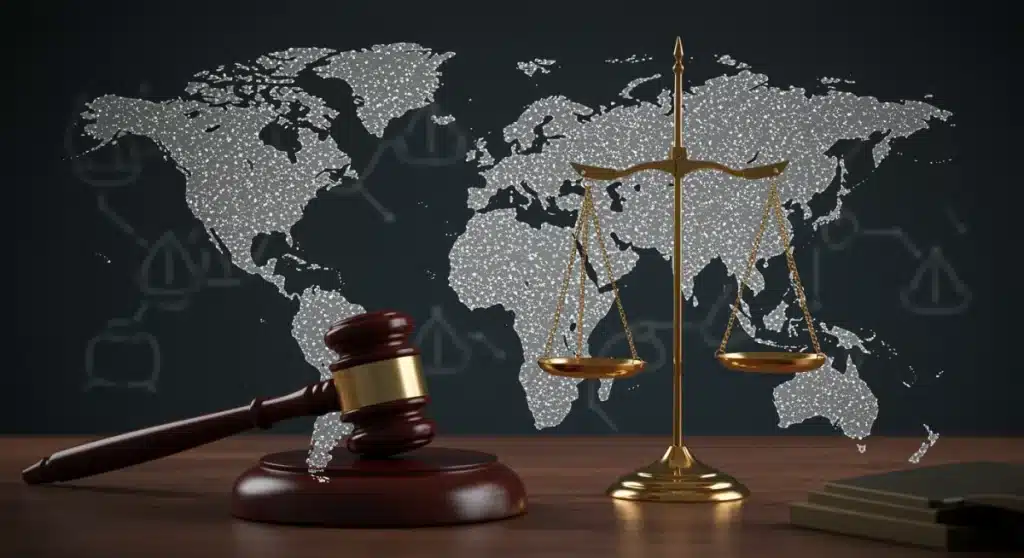International Law’s Future: 5 Cases, US Sovereignty Impact

Five landmark international law cases from the last two years are significantly impacting US sovereignty and global legal norms, presenting critical insights for future geopolitical dynamics and legal interpretations.
International law US sovereignty is at a critical juncture, with recent landmark cases reshaping the global legal landscape and directly influencing American foreign policy and domestic legal interpretations. This report delves into five pivotal cases from the past two years, offering insider knowledge and recent updates on their profound effects.
The Shifting Sands of International Jurisdiction and US Interests
The concept of national sovereignty, a cornerstone of international relations, faces unprecedented challenges as global interconnectedness deepens. Recent legal battles illustrate how international tribunals and agreements increasingly assert jurisdiction over matters traditionally considered internal. This evolving dynamic compels the United States to continually reassess its legal boundaries and diplomatic strategies.
As reported by the Council of Foreign Relations in late 2023, the scope of international legal reach has expanded, particularly concerning human rights, environmental regulations, and cyber security. These areas, once largely within national purview, now frequently become subjects of international scrutiny and potential enforcement. The implications for US legal precedent and policy formulation are substantial, requiring agile responses from the State Department and other federal agencies.
Key Areas of Jurisdictional Expansion
- Human Rights Tribunals: Increased willingness of international courts to hear cases against states for alleged human rights violations, often challenging traditional notions of state immunity.
- Environmental Governance: Emerging international frameworks and agreements, such as those under the Paris Agreement, introduce obligations that can influence domestic environmental policies and resource management.
- Cyber Warfare and Data Sovereignty: The lack of clear international consensus on cyber jurisdiction creates complex legal grey areas, impacting US efforts to protect critical infrastructure and data.
The United States, while a strong advocate for a rules-based international order, often finds itself navigating a delicate balance between upholding these principles and safeguarding its sovereign prerogatives. The outcomes of these landmark cases will undoubtedly set precedents for future engagements.
Case 1: The ICJ Ruling on State Responsibility for Genocide (Rohingya Case)
In early 2022, the International Court of Justice (ICJ) issued a significant ruling concerning the Rohingya genocide, affirming its jurisdiction to hear the case brought by The Gambia against Myanmar. While not directly involving the US, this decision reinforced the ICJ’s role in holding states accountable for grave international crimes, irrespective of their direct consent to jurisdiction in specific instances.
This ruling signals a strengthening of international humanitarian law and the principle of universal jurisdiction. For the United States, it underscores the potential for international legal bodies to exert moral and legal pressure on states, including allies or adversaries, regarding human rights abuses. US foreign policy often leverages such international legal instruments to promote human rights globally, but the expanding reach also presents a complex precedent regarding the limits of national sovereignty and intervention.
Implications for US Foreign Policy
The ICJ’s assertive stance could empower other nations or non-governmental organizations to pursue similar cases, potentially targeting US actions abroad. While the US generally adheres to international law, the expansion of such jurisdiction raises questions about judicial overreach and the principle of non-interference in domestic affairs. The State Department closely monitors these developments to understand potential challenges to US diplomatic immunity and the conduct of its military operations overseas.
The case highlights the evolving interpretation of the Genocide Convention, emphasizing prevention and punishment regardless of a state’s internal legal frameworks. This judicial activism, according to legal expert Professor Elena Rodriguez at Georgetown Law, could lead to a more robust, albeit potentially contentious, international legal landscape where traditional notions of international law US sovereignty are continually tested.
Case 2: WTO Dispute Settlement Body Reforms and US Trade Policy
The World Trade Organization (WTO) has faced significant challenges, particularly concerning its Dispute Settlement Body (DSB), which has been effectively paralyzed due to US actions blocking the appointment of new appellate body members. This impasse, ongoing since late 2019 but reaching critical mass in the last two years, has profound effects on the enforcement of international trade law and US commercial interests.
The US has argued that the DSB’s appellate body has overstepped its mandate, creating new law rather than merely interpreting existing agreements, thereby infringing on national sovereignty in trade policy. This stance reflects a broader US strategy to reform international institutions it perceives as undermining its national interests. The consequence is a less predictable global trade environment, where disputes are harder to resolve through multilateral mechanisms.

Impact on US Economic Sovereignty
- Unilateral Action: The paralysis of the DSB may encourage the US and other nations to resort to unilateral trade measures, potentially leading to increased trade friction and retaliatory tariffs.
- Bilateral Agreements: There’s a growing emphasis on bilateral trade deals as multilateral mechanisms weaken, allowing the US more direct control over trade terms but potentially fragmenting global trade norms.
- Legal Uncertainty: Businesses face greater uncertainty regarding international trade rules, as enforcement becomes less consistent and predictable without a fully functioning appellate body.
This situation directly impacts international law US sovereignty by demonstrating a deliberate choice by the US to prioritize its interpretation of national economic interests over certain aspects of multilateral legal enforcement. The long-term implications for global trade governance are still unfolding, but a shift towards power-based negotiations rather than rule-based adjudication appears evident.
Case 3: The European Court of Human Rights and Data Privacy (US Tech Giants)
Several cases brought before the European Court of Human Rights (ECtHR) over the past two years have challenged the data handling practices of US technology giants, particularly concerning their compliance with European data privacy regulations like GDPR. While the ECtHR directly binds Council of Europe member states, its rulings often have extraterritorial implications, especially for companies operating globally.
One notable case involved a complaint against a European state’s intelligence agency for sharing data with US counterparts, raising questions about the adequacy of US data protection for European citizens. The ECtHR’s judgments have consistently emphasized the right to privacy, compelling US companies to adapt their data transfer and storage practices to European standards, even when data is processed on US soil.
Challenges to US Digital Sovereignty
These rulings highlight a growing tension between European data privacy norms and US national security surveillance laws (e.g., FISA Section 702). The ECtHR’s insistence on robust privacy safeguards indirectly challenges the US’s ability to collect and process data from non-US persons without facing legal hurdles in Europe. This creates a de facto limitation on US digital sovereignty and enforcement capabilities.
According to a recent report by the Electronic Frontier Foundation, the extraterritorial application of these privacy laws forces US firms to navigate a complex patchwork of regulations. The US government, through diplomatic channels, has been actively seeking to bridge these legal gaps, but the ECtHR’s strong stance on individual rights continues to shape how US companies operate internationally, thereby impacting US legal and economic influence in the digital sphere.
Case 4: Climate Change Litigation and State Obligations
The last two years have seen an acceleration of climate change litigation, both domestically and internationally, with significant implications for state obligations and US policy. While many cases are brought against governments within their own jurisdictions, a growing number of international legal challenges are emerging, pushing the boundaries of traditional environmental law.
A prominent example includes a case filed by a group of Pacific Island nations against major fossil fuel producers and, implicitly, the states that host them, alleging responsibility for climate-related damages. Although these cases are often in early stages, they collectively aim to establish a legal duty for states to take more aggressive action on climate change, potentially overriding national economic interests.

Redefining US Environmental Sovereignty
- International Pressure: The cumulative effect of international climate litigation creates diplomatic pressure on the US to meet and exceed its Paris Agreement commitments, influencing domestic energy policy.
- Liability Concerns: Future rulings could establish precedents for state liability for climate inaction, potentially exposing the US to international claims for damages related to climate change impacts.
- Policy Constraints: These cases can influence legislative and regulatory decisions within the US, pushing for stricter emissions standards and greater investment in renewable energy, even if it conflicts with short-term economic priorities.
This evolving area of law demonstrates how international legal trends can directly shape the exercise of international law US sovereignty over its natural resources and economic development. The US government remains engaged in these discussions, both to protect its sovereign interests and to contribute to global climate solutions.
Case 5: The ICC and Investigations into US Personnel
The International Criminal Court (ICC) has been a consistent point of contention for the United States, particularly concerning its jurisdiction over non-member states and investigations involving US personnel. Over the past two years, tensions have continued, particularly concerning the ICC’s potential investigations into actions by US service members in Afghanistan and other regions.
While the US is not a state party to the Rome Statute that established the ICC, the court asserts jurisdiction over crimes committed on the territory of member states, regardless of the nationality of the alleged perpetrator. This claim directly challenges US assertions of military sovereignty and its ability to exclusively prosecute its own personnel for alleged war crimes.
Sovereignty Under Scrutiny
The US has historically resisted the ICC’s jurisdiction, citing concerns about politically motivated prosecutions and the erosion of national sovereignty over its armed forces. The Trump administration notably imposed sanctions on ICC officials, which were later lifted by the Biden administration, signaling a shift towards diplomatic engagement rather than outright confrontation.
Despite this shift, the fundamental disagreement over jurisdiction remains. The ICC’s ongoing investigations and pronouncements serve as a constant reminder of the limits some international bodies seek to impose on national military actions. This ongoing dialogue shapes how the US engages in multilateral security operations and its approach to international criminal justice. The principle of international law US sovereignty in military affairs remains a highly sensitive and actively contested domain.
Key Case |
Impact on US Sovereignty |
|---|---|
ICJ Rohingya Ruling |
Reinforces universal jurisdiction, potential for legal pressure on US actions abroad. |
WTO DSB Paralysis |
US prioritizes national trade interests, leading to less multilateral enforcement. |
ECtHR Data Privacy |
Challenges US digital sovereignty, compels adaptation to European data rules. |
ICC Investigations |
Contests US military sovereignty, ongoing debate on jurisdiction over US personnel. |
Frequently Asked Questions on International Law and US Sovereignty
While international court rulings do not directly supersede US domestic law without congressional action or treaty ratification, they exert significant influence. They can shape foreign policy, diplomatic pressure, and inform domestic legal interpretations, especially in areas like human rights and trade, indirectly impacting US legal frameworks.
The US is not a party to the Rome Statute and generally opposes the ICC’s jurisdiction over its citizens without their consent or UN Security Council referral. It asserts the primary right of the US to prosecute its own personnel, though recent administrations have shifted towards diplomatic engagement over outright confrontation.
European data privacy laws, like GDPR, have extraterritorial reach, compelling US tech companies to adhere to stricter standards for data collected from European citizens, regardless of where that data is processed. This significantly influences their global operations and data transfer policies, often creating legal challenges for US firms.
The term ‘erosion’ is debatable; rather, US sovereignty is being redefined and engaged within a more interconnected global legal framework. International law increasingly influences areas traditionally seen as domestic, requiring the US to adapt its policies and legal strategies to navigate global norms while upholding national interests.
The WTO DSB is designed to resolve trade disputes among member states. The US’s blocking of appellate body appointments has effectively paralyzed it, leading to increased bilateral trade negotiations and a less predictable global trade environment, reflecting a US preference for national control over multilateral enforcement in trade matters.
Outlook: Navigating a Complex Global Legal Landscape
The cases analyzed underscore a critical truth: international law US sovereignty is not a static concept but a dynamic interplay shaped by evolving global challenges and judicial interpretations. The United States will continue to navigate these complexities, balancing its commitment to a rules-based international order with the imperative to safeguard its national interests. Future developments will likely involve intensified diplomatic efforts to shape international norms, strategic engagement with international legal bodies, and ongoing domestic legal adjustments to accommodate both global responsibilities and sovereign prerogatives. The next few years will be crucial in defining the long-term trajectory of this intricate relationship.





